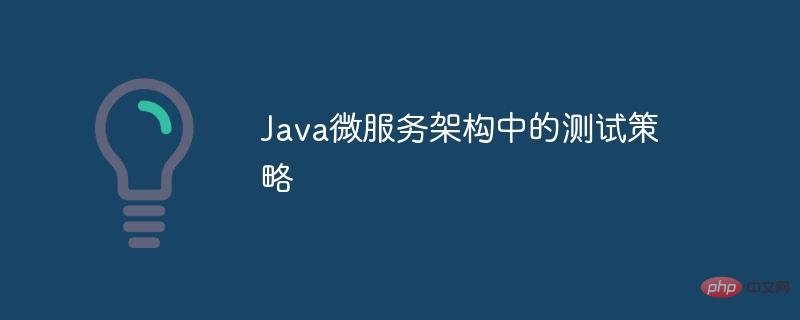
In Java microservice architecture, testing strategies include: unit testing: testing service components in isolation to ensure the correctness of individual components. Integration testing: Test the interaction between services and verify the collaborative work between services. Contract testing: Verifying the agreement or convention between services to ensure that the services follow the expected communication method.

Testing strategy in Java microservice architecture
Introduction
In microservices In service architecture, testing is crucial to ensure the robustness, reliability, and maintainability of services. This article explores several testing strategies in microservice architecture and provides practical cases for reference.
Unit testing
@Test
public void testUserServiceFindById() {
// 设置模拟对象
UserRepository userRepository = Mockito.mock(UserRepository.class);
UserService userService = new UserService(userRepository);
// 模拟用户查找操作
Mockito.when(userRepository.findById(1L)).thenReturn(Optional.of(new User(1L, "John Doe")));
// 断言查找结果
assertThat(userService.findById(1L).getId(), is(1L));
assertThat(userService.findById(1L).getName(), is("John Doe"));
}Integration testing
@WebMvcTest(UserController.class)
class UserControllerIntegrationTest {
@Autowired
private MockMvc mockMvc;
@Autowired
private UserRepository userRepository;
@BeforeEach
public void setup() {
// 设置模拟用户数据
userRepository.deleteAll();
userRepository.save(new User(1L, "John Doe"));
}
@Test
public void testFindById() throws Exception {
mockMvc.perform(MockMvcRequestBuilders.get("/users/1"))
.andExpect(MockMvcResultMatchers.status().isOk())
.andExpect(MockMvcResultMatchers.content().json("{id:1,name:'John Doe'}"));
}
}Contract Test
@SpringJUnitConfig
class ContractTest {
@Autowired
private PactVerifier verifier;
@TestTemplate
@ExtendWith(SpringExtension.class)
public void pactVerificationTest(MockServerServer wireMockServer, Pact providerState, Interaction interaction) throws IOException {
verifier.verifyPact(providerState, interaction, wareMockServer.getUrl());
}
@Pact(provider="UserService", consumer="Client")
public RequestResponsePact createPact(MockServer mockServer) {
return Pact.define(
(request) -> {
request.method("GET")
.path("/")
.headers(singletonMap("Content-Type", "application/json"));
},
(response) -> {
response.status(200)
.body("{\"id\":1,\"name\":\"John Doe\"}")
.headers(singletonMap("Content-Type", "application/json"));
}
);
}
}Conclusion
By implementing unit testing, integration testing and contract testing, the robustness and reliability of services can be ensured in the Java microservice architecture. These strategies help identify and resolve issues during deployment and operation, thereby improving overall application quality.
The above is the detailed content of Testing strategies in Java microservices architecture. For more information, please follow other related articles on the PHP Chinese website!